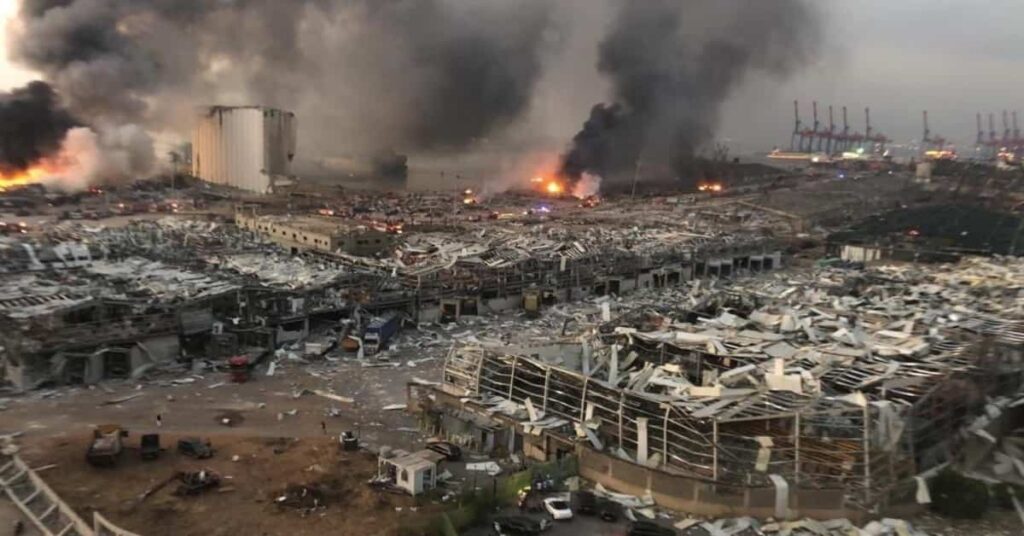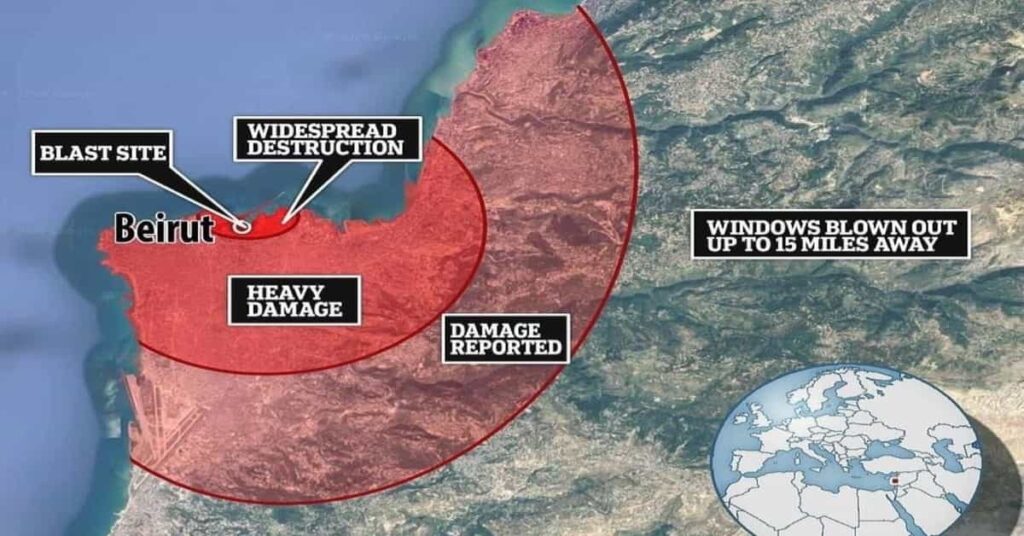
Lebanon’s government officials linked the blast to some 2,750 tonnes of confiscated ammonium nitrate that were being stored in a warehouse at the port for six years. However the exact reason of the blast in Beirut port is yet to come after a detail investigation of the incident.
Lebanese officials knew of the dangers posed by the ammonium nitrate stored at the port for years, according to public records, but failed to act.
The massive explosion on Tuesday sent shockwaves across the city of Beirut, causing widespread damage as far as the outskirts of the capital. According to the recent updates, more than 100 people have been killed and over 4000 wounded.
Rescue workers dug through rubble as fires continued to burn.
Rescue workers still struggling to treat thousands of people wounded in an enormous explosion that rocked Beirut turned their attention on Wednesday morning to the desperate search for survivors.
Officials said they expect the death toll to rise further as emergency workers dig through the rubble to search for survivors.
The blast, so powerful it could be felt more than 150 miles away in Cyprus, leveled whole sections of the city near the port of Beirut, leaving nothing but twisted metal and debris for blocks in Beirut’s downtown business district.

Beirut’s city governor Marwan Abboud said up to 300,000 people have lost their homes and authorities are working on providing them with food, water and shelter.
Lebanon to place Beirut port officials under house arrest
The Lebanese cabinet has decided to place port officials under house arrest until investigations determine who is responsible for the blast, a governmental source reported.
Lebanon’s Information Minister Manal Abdelsamad said that the military would oversee the house arrest of those responsible for storage and guarding at the Beirut port since June 2014.
Abdelsamad told reporters that these poeople would be put under house arrest “as soon as possible” after their identities were determined by an investigative committee that was formed followinf the blast.
The committee is headed by the justice minister and includes the prime minister and the heads of major security agencies.
The house arrests would be done “within the next five days”, which is when the committe is expected to reveal its findings and hand them over to the judiciary. Source: Al Jazeera
Ammonium nitrate: what is it and why did it cause the blast in Beirut?
2,750 tons of the chemical that had been stored in a Beirut warehouse blew up, killing dozens of people and injuring many more.
Ammonium nitrate, which Lebanese authorities have said was the cause of the Beirut blast, is an odourless crystalline substance commonly used as a fertiliser that has been the cause of numerous industrial explosions over the decades.
These include at a Texas fertiliser plant in 2013 that killed 15 people and was ruled deliberate, and another at a chemical plant in Toulouse, France, in 2001 that killed 31 people but was accidental.
When combined with fuel oils, ammonium nitrate creates a potent explosive widely used by the construction industry, but also by insurgent groups like the Taliban for improvised explosives.
It was also a component in the bomb behind the 1995 Oklahoma City terrorist attack.
In agriculture, ammonium nitrate fertiliser is applied in granule form and quickly dissolves under moisture, allowing nitrogen – which is key to plant growth – to be released into the soil.
Lebanese Prime Minister Hassan Diab said 2,750 metric tons of ammonium nitrate that had been stored for years in a Beirut portside warehouse had blown up, killing dozens of people and causing unprecedented damage to the Lebanese capital.
However, under normal storage conditions and without very high heat, it is difficult to ignite ammonium nitrate, Jimmie Oxley, a chemistry professor at the University of Rhode Island, told AFP.
“If you look at the video [of the Beirut explosion], you saw the black smoke, you saw the red smoke, that was an incomplete reaction,” she said.
“I am assuming that there was a small explosion that instigated the reaction of the ammonium nitrate – whether that small explosion was an accident or something on purpose I haven’t heard yet.”
That’s because ammonium nitrate is an oxidiser – it intensifies combustion and allows other substances to ignite more readily, but is not itself very combustible.
For these reasons, there are generally very strict rules about where it can be stored; for example, it must be kept away from fuels and sources of heat.
In fact, many countries in the European Union require that calcium carbonate be added to ammonium nitrate to create calcium ammonium nitrate, which is safer.
In the United States, regulations were tightened significantly after the Oklahoma City attack.
Under the Chemical Facility Anti-Terrorism Standards, for example, facilities that store more than 2,000 pounds (900 kilograms) of ammonium nitrate are subject to inspections.
Despite its dangers, Jimmie Oxley said legitimate uses of ammonium nitrate in agriculture and construction had made it indispensable.
“We wouldn’t have this modern world without explosives, and we wouldn’t feed the population we have today without ammonium nitrate fertiliser,” she said.
“We need ammonium nitrate, we just need to pay good attention to what we’re doing with it.” Source: Telegraph Uk
